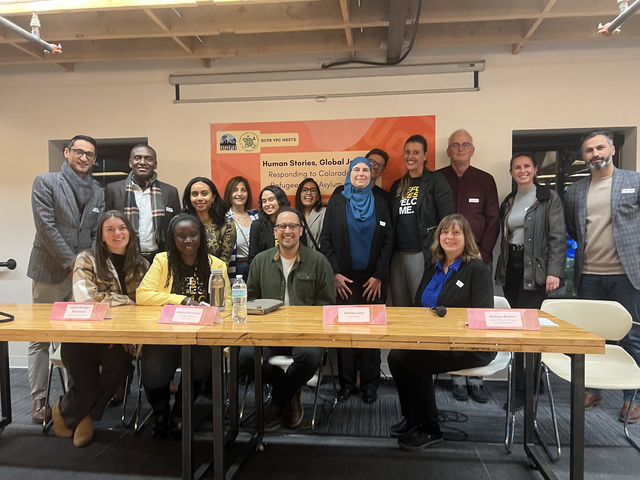Last week, staff members of the IRC in Denver's joined forces with representatives from the Denver Council on Foreign Relations, multiple local government and non-profit leaders, as well as about 100 interested guests with one common goal: To better understand the strategies in place to support Colorado’s new refugees and asylum seekers.
The panel discussion titled "Human Stories, Global Journeys: Responding to Colorado's new refugees and asylum seekers" was moderated by Dr. James Walsh, assistant professor of political sciences at the University of Colorado Denver, who specializes in Labor, Working Class and Immigration History/Politics, as well as U.S. Social Movements and Community Organizing. Dr. Walsh was joined on stage by Wesley Brockway - Legal Services Director at the IRC in Denver, Melissa Burton - Policy Analyst at the Denver Office of Refugee and Immigrant Affairs, Andrea Loya - Executive Director at Casa de Paz, and Jaime Koehler Blanchard - Program Director at Lutheran Family Services Rocky Mountain.
The panel opened with the experts defining relevant terminology, such as nuances between the terms "refugee", "asylum seeker" and "immigrant" often used interchangeably in the public discourse but fundamentally different in legal settings. Jaime Koehler Blanchard explained, that while all of the terms are used to describe "people in transit," the term "refugee" is by international law reserved for individuals fleeing their native country due to (the risk of) persecution - because of race, political ideology, ethnicity, sexuality, religion, or membership of a social group. Most domestic definitions, however, focus on how individuals are entering the United States and classify "refugees" as individuals who arrive in the US through the US Resettlement Program, a program requiring coordination with both federal and international agencies prior to an individual's setting foot on US soil. "Asylum seekers" on the other hand, generally speaking arrive to the US through a variety of ways and apply for asylum after they have reached the US.
However, while understanding the legal implications of these terms can be helpful, many panelists advocated for broadening definitions in order to better understand and serve immigrant populations. As Wesley Brockway emphasized:
“There are more overlaps within these populations as there are differences. These are all people that are seeking protection! They are all fleeing dangerous situations and are seeking protection in ways that are fully recognized by domestic and international law and they have a right to do so.”
The second question of the evening focused on deciphering factors that drive refugees specifically to Colorado and the city of Denver. Andrea Loya mentioned the presence of jobs, opportunities, and diversity; drawing from her own experience as an immigrant who's family chose Denver. The panelists further highlighted Denver’s longstanding history of welcoming immigrants and the presence of communities where new migrants feel represented and supported. However, the experts also highlighted a great lack of regional and national coordination in resettlement efforts, and as a result thereof the incredible overwhelm of all key players and the enormous challenge for Denver to respond promptly and effectively to the influx of new migrants.
Next, the panel moved into a discussion on the dominant policies in immigration - both state and federal. The panelists univocally pointed to the unpredictability of immigration policy - based in both partisan changes, as well as local implementation. This unpredictability however greatly impacts immigrants, by creating a complex web of forms and laws they must navigate in order to receive support, Further, the constant changes in policy lead to upheaval in the lives of people already in transit and in their supporting organizations. Andrea Loya exemplified how for example the repeal of Title 42 (which ended the Covid19 practice of quickly expelling migrants back to their countries of origin) led to an unprecedented release of up to 75 detainees daily, whereas current number range between 5-10. Similarly, Wes Brockway highlighted the increase from 11,000 new arrivals a year to 125,000 the next due to changes in the presidential denomination. He asked:
“If the infrastructure has been decimated over the past three years, how are we supposed to meet that immediate need all of a sudden?"
The final question of the evening was aimed at providing a more global perspective - leaning on both, trends in migration, as well as international case studies. Jamie Koehler-Blanchard spoke on global trends in migration, including the lengthy journeys of many migrants through various countries. She emphasized that:
"The way you look, the color of your skin, the way you speak all impact your chances in resettlement due to an unfortunate but implicit bias in the global immigration system."
Between both - panelists and audience members - a lively and passionate discourse was spurred, and consensus slowly rose on the imminent need to reform and reshape immigration policies, as well as shift the conversation away from increased border security and towards an improved infrastructure.
According to Casey Moher, Chair of the Young Professionals of Colorado & Denver Council on Foreign Relations Board Member, last week's panel discussion was the largest event hosted in years. The grand turnout and active engagement clearly bears testament to the importance of discussing how we respond to the arrival of Colorado's new refugees and asylum seekers, and to our city's community’s efforts in reframing the immigration conversation in the midst of a nationally extremely divisive political environment.

The IRC in Denver applauds the Denver Council on Foreign Relations for hosting this important event, and thanks Dr. James Walsh, Wesley Brockway, Melissa Burton, Andrea Loya, Jaime Koehler Blanchard, as well as all guests for the insightful discussion.
Written by: Victoria Torres - The IRC Denver's Communications and Development Intern
Edited by: Hanna Simmons - The IRC in Denver's Acting Development Manager